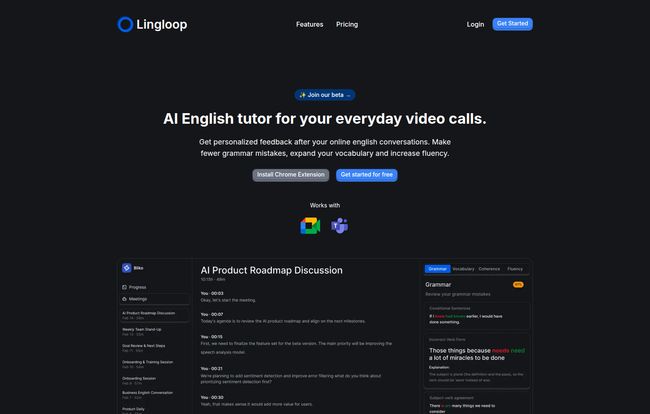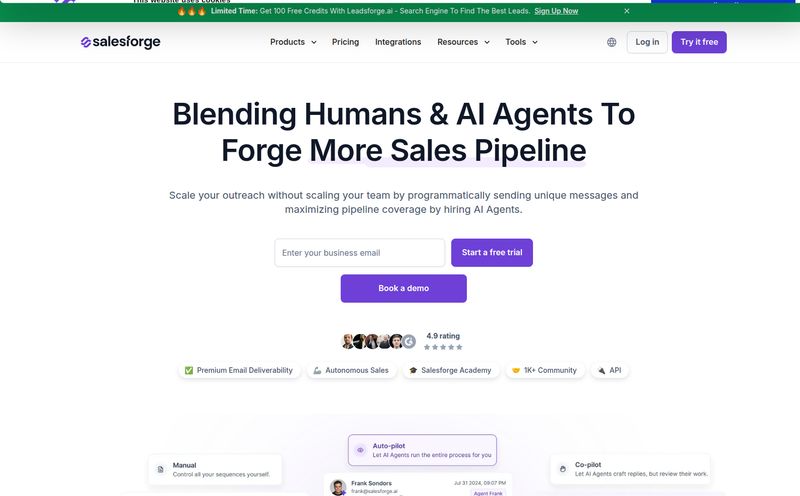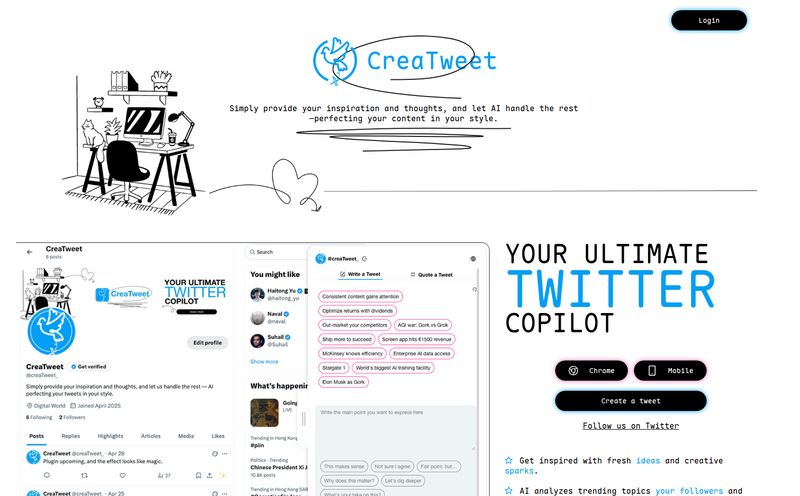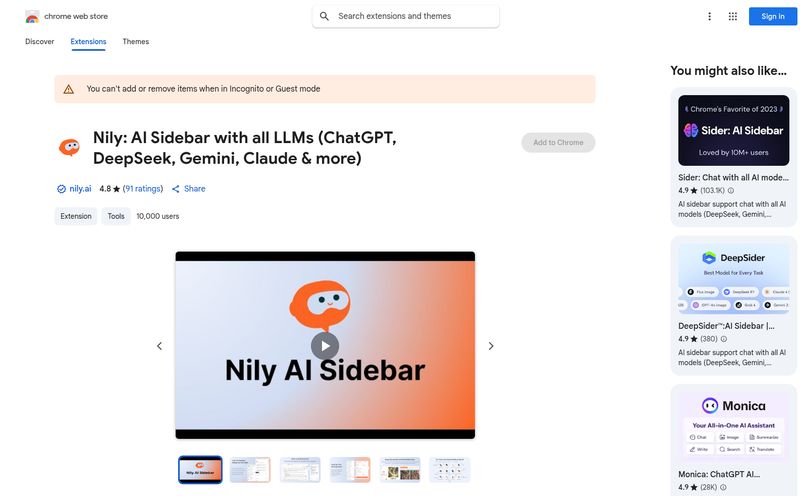Alright, let’s have a real chat. If you’re like me, your calendar is a terrifying mosaic of back-to-back video calls. And if English isn't your first language, each one of those little colored blocks can feel like a mini-performance review. You’re not just discussing quarterly reports; you’re also mentally translating, worrying about prepositions, and hoping you sound as smart as you actually are. It's exhausting.
For years, the solution has been... well, clunky. Duolingo is great for vocabulary on the bus, but it won’t help you sound more confident when presenting to stakeholders. Hiring a human tutor is effective but expensive and a whole other block on that already-packed calendar. I've been in the SEO and digital marketing world for a long time, and I'm always on the lookout for tools that genuinely solve a problem without adding more friction. So when I stumbled upon Lingloop, I was intrigued. An AI tutor that just... listens to your regular calls and gives you feedback later? Sounds too good to be true. So, naturally, I had to try it.
So, What Exactly is Lingloop?
Think of Lingloop as a post-game analysis for your spoken English. It’s an AI-powered companion that plugs right into your life—or, more specifically, your Google Meet calls. You don't have to schedule a special 'practice session'. You just live your life, have your meetings, talk to your colleagues, and afterward, Lingloop quietly gives you a report card.
It's not just about pointing out mistakes. The whole idea is to provide personalized, targeted feedback on your grammar, vocabulary, and fluency based on how you actually speak in real-world situations. It’s designed to help you spot those fossilized errors—you know, the mistakes you’ve been making for so long you don’t even notice them anymore—and build better speaking habits. No more wondering, “Did I use the right tense in that meeting?” Lingloop has the receipts.
My First Impressions and Getting It Set Up
Getting started was refreshingly simple. It’s a Chrome Extension, so a couple of clicks and you're pretty much done. No hefty software to download. I appreciate that. The less friction, the better.
After my first few Google Meet calls with Lingloop active, I logged into the dashboard to see the verdict. And wow. It was… detailed. The tool provides a full transcript of the conversation, timestamped and everything. But the magic is in the analysis pane. It highlights specific moments, points out grammatical hiccups, and even suggests better ways to phrase things. Seeing my own words laid out with corrections like “You said X, a better way could be Y” was incredibly illuminating.
For example, it caught me using an incorrect verb form in a conditional sentence. A small thing, but something that can subtly undermine your credibility in a professional setting. It’s like having a tiny, very polite grammar nerd sitting on your shoulder, but one who waits until after the meeting to give you notes. Which is much less awkward.
The Good Stuff: What I Genuinely Liked
After playing around with it for a while, a few things really stood out to me as major wins.
Personalized Feedback is a Game-Changer
This isn't just generic advice. The feedback is tailored to your specific weak spots. If you constantly struggle with subject-verb agreement, Lingloop will keep flagging it. If your vocabulary is a bit repetitive, it will offer synonyms. This level of personlized attention is something you usually only get from a one-on-one tutor. The AI identifies your patterns and gives you actionable steps to improve, which is the fastest way to make real progress.
The Google Meet Integration is Chef's Kiss
I can’t overstate how important this is. The best tools are the ones that fit into your existing workflow. By integrating directly with Google Meet, Lingloop removes the entire 'I need to make time to practice' barrier. You’re already in these meetings, so you’re essentially getting free practice. It’s a brilliant way to turn a normal workday into a learning opportunity without any extra effort. It just works in the background, which is beautiful.
Tracking Your Progress (Without the Cringe)
Lingloop provides scores for grammar, vocabulary, coherence, and fluency. Seeing these numbers change over time is a huge motivator. It’s one thing to feel like you’re getting better, but it’s another to see the data to back it up. When you have a tough call and feel like you stumbled a lot, you can look back at your progress chart and see how far you’ve come. It turns the daunting task of improving your English into a manageable, even gamified, process.
Let's Be Real: The Not-So-Perfect Parts
No tool is perfect, of course. While I’m pretty bullish on Lingloop, there are a couple of things to be aware of.
The Platform Limitation
Right now, Lingloop is a one-trick pony when it comes to platforms: it’s Google Meet only. If your company lives on Microsoft Teams or Zoom, you’re out of luck for now. This is probably the biggest drawback. I’m hoping they expand their integrations soon, because this would be just as valuable for users on other platforms.
The 'Coming Soon' Tease
The Pro plan promises “Unlimited exercises,” which sounds amazing—practice drills based on your specific mistakes? Yes, please. But as of this writing, that feature is still listed as “coming soon.” It’s a classic tech startup move, and while I’m excited for it, you’re paying for a promise right now, not a delivered feature. Something to keep in mind.
Breaking Down the Lingloop Pricing
The pricing structure is pretty straightforward, which I appreciate. No confusing credit systems or weird tiers.
| Plan | Price | Key Features |
|---|---|---|
| Hobby | Free | 10 call analyses per month, Google Meet integration. |
| Pro | $10 / month | Unlimited feedback, Google Meet integration, Unlimited exercises (coming soon). |
| Enterprise | Custom | Volume discounts, Dedicated support. |
The Hobby plan is a great way to test the waters. 10 call analyses a month is enough to see if it works for you. The Pro plan, at $10 a month, seems very reasonable for unlimited feedback—that’s less than a single fancy coffee in most cities. If you're serious about improving, this is a no-brainer. The Enterprise plan is for teams, which makes a ton of sense for international companies looking to upskill their employees.
Who is Lingloop Actually For?
In my opinion, Lingloop is perfect for a few specific types of people. The non-native English speaking professional who spends a good chunk of their day on Google Meet. The remote worker in a global team who wants to communicate more clearly and confidently. The ambitious student preparing for an international career. Basically, if you are actively using English in a professional or academic setting and want to polish your spoken skills without adding another 'to-do' to your list, this tool is designed for you.
Frequently Asked Questions
How does Lingloop actually improve my spoken English?
It works by analyzing your real conversations to identify recurring errors in grammar and limited vocabulary. By showing you what to fix and tracking your improvement over time, it helps you build better speaking habits and boost your confidence.
What platforms does Lingloop integrate with?
Currently, Lingloop only integrates with Google Meet via a Chrome Extension. The company has not yet announced integrations with other platforms like Zoom or Microsoft Teams.
Is my conversation data secure with Lingloop?
This is a big question for any tool that listens to conversations. According to their website, they take data privacy seriously. As a user, you should always review the privacy policy of any such tool to make sure you are comfortable with how your data is handled.
What’s the main difference between the Hobby and Pro tiers?
The biggest difference is the number of call analyses. The free Hobby tier gives you 10 per month, which is a decent sample. The Pro tier gives you unlimited feedback, which is necessary for anyone who has more than a couple of important meetings a week and is serious about consistent improvement.
How is progress tracked over time?
Lingloop provides metrics on your fluency, grammar, and vocabulary. You can see your scores and how they evolve over time, giving you a clear and motivating overview of your improvement.
My Final Verdict: Is Lingloop Worth Your Time?
So, what’s the final word? I think Lingloop is a genuinely innovative and useful tool. It addresses a real pain point in a smart, low-friction way. The world of AI is producing a lot of noise and gimmicks, but this feels different. It's practical. It’s focused.
Yes, it's limited to Google Meet for now, and I’m tapping my foot waiting for those personalized exercises. But even with those caveats, the core functionality is solid. If you're a Google Meet user looking to sharpen your spoken English, the free plan is a risk-free way to see what it can do. And if you like what you see, the Pro plan is a small investment for what could be a significant career boost. It’s not just about learning English; it’s about being heard and understood correctly. And in the world of endless video calls, that's a powerful thing.




